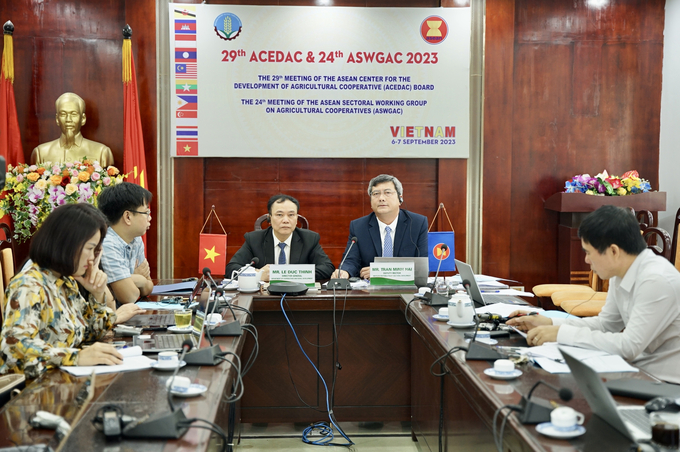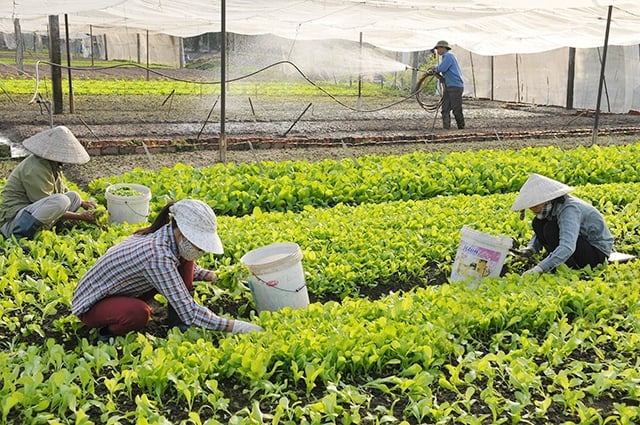May 29, 2025 | 23:53 GMT +7
May 29, 2025 | 23:53 GMT +7
Hotline: 0913.378.918
May 29, 2025 | 23:53 GMT +7
Hotline: 0913.378.918
On September 6, the 29th Meeting of the ASEAN Centre for the Development of Agricultural Cooperatives Board (ACEDAC) took place virtually at the Ministry of Agriculture and Rural Development's headquarters. Representatives from the ASEAN Secretariat, the ACEDAC Secretariat, the agricultural cooperative administration agencies of ASEAN member states (except Singapore), and some international organizations were present at the event.
In accordance with the ASEAN protocol, Vietnam and Brunei Darussalam recommence their roles as the 29th Meeting's Chair and Vice-Chair, respectively. Mr. Le Duc Thinh, Director of the Department of Economic Cooperation and Rural Development, represented MARD at the meeting. Mr. Tran Minh Hai, Vice Rector of the Institute of Public Policy and Rural Development, co-hosted the event.
Regarding the general situation of the cooperative development process in Vietnam, Mr. Le Duc Thinh reported that the quantity and character of agricultural cooperatives in Vietnam have undergone numerous positive changes in recent years. By the end of June 2023, Vietnam will have 20,057 agricultural cooperatives, representing approximately 67% of the total number of cooperatives in all sectors. These cooperatives will attract nearly 3.8 million members, the majority of whom will be farming households. The agricultural cooperative model in Vietnam assists small producers in reducing production costs, overcoming production fragmentation, applying the same production process, and producing high-quality agricultural goods.
Agricultural cooperatives in Vietnam have gradually become an important link in the development of the value chain linking the production, processing, and consumption of agricultural products; this is a crucial premise for promoting the formation of small- and medium-scale agricultural production, processing, and consumption complexes in many agricultural commodity-concentrated regions.
In addition, many agricultural cooperatives have provided services in rural areas, including ecotourism, internal credit, market management, environmental sanitation, and pure water, with the aim of maximizing benefits for members and the community.

Representatives of MARD, Mr. Le Duc Thinh - Director of the Department of Economic Cooperation and Rural Development, and Mr. Tran Minh Hai - Vice Rector of the Institute of Public Policy and Rural Development co-chaired an online meeting of the 29th ASEAN Agricultural Cooperative Development Center (ACEDAC) Conference. Photo: Linh Linh.
Agriculture and Rural Development is responsible for reorganizing production, constructing connections in the value chain of agricultural products, and advancing the collective economy in Vietnam. One of the three pillars of the industry restructuring process is cooperatives. agriculture and new rural construction, with collective economy and cooperatives as essential instruments and solutions (pillars) for achieving agricultural and rural development objectives.
However, innovating and enhancing collective economic efficiency in Vietnam still faces numerous obstacles, including a failure to adequately promote the organizational role and improve the quality of services for agricultural production, particularly primary services. The operational efficacy of processing, preserving, packaging, transporting, and ingesting agricultural products is low.
"In comparison to agricultural cooperatives in other nations, particularly in the ASEAN region, Vietnam's agricultural cooperatives still have limitations. Mr. Thinh emphasized the significance of the spirit of cooperation among agricultural cooperatives in ASEAN, stating, "Through the Conference, Vietnam is eager to learn and share experiences in developing cooperatives of ASEAN countries in order to jointly support cooperatives for sustainable development."
During the conference, ACEDAC member countries were able to exchange models and initiatives to promote agricultural cooperatives in order to contribute to agricultural and rural development objectives, as well as strategies to strengthen the role of agricultural cooperatives in the food promotion chain.
Sharing experience in constructing food marketing chains, the representative of Thailand stated that his nation designs numerous pilot models for food marketing chain support groups.
"Thailand has policies to promote the development of food marketing chains, including the establishment of standards, the interconnection of networks, and the implementation of marketing activities. Currently, Thailand is working to implement food marketing promotion programs, such as standards for good agricultural practices (GAP) and agricultural zoning, while also constructing product networks.

Vietnam is making efforts to build a local product brand and a brand name for local agricultural products.
Due to the high costs of food and food production, Thailand seeks to collaborate with countries like the Philippines and Vietnam in order to purchase their products and incorporate them into the food chain.
In addition, Thailand introduces standards for sound agricultural practice, organizes training courses to increase the capacity of target groups, and provides product promotion models in linked chains. In addition, localize the agricultural regions and products of each locale, as well as cooperative organizations, in order to identify the outputs and inputs of the supply chain.
After zoning is complete, workshops will be conducted for the cooperative's products to discuss production, processing, marketing strategies, incentive packages, and bringing them to market.
Thailand has stated that it hosts networking sessions for merchants and customers. As a consequence, many cooperatives in 31 provinces of Thailand have built connections so that sellers and buyers can trade through their own platforms, the number of cooperative members has increased, and the number of cooperatives with GAP certification has increased. Meanwhile, more and more products of high quality are being introduced to the market.
Mr. Tran Minh Hai, Vice Reckon of the Institute of Public Policy and Rural Development, stated that Vietnam has been attempting to build local product brands for the past two years under the One Commune One Product (OCOP) program, similar to Thailand. Mr. Hai also asserted that linking businesses with agricultural cooperatives and entering into contracts with them is crucial for increasing product output and brand recognition.
Translated by Linh Linh

(VAN) Ms. Nguyen Thi Dung, Deputy Director of Ngoc Hoang Cooperative, shared about the journey of bringing dragon fruit to Europe, achieving annual revenues in the billions of VND.

(VAN) Bamboo products from Thang Tho Bamboo Cooperative have reached many countries around the world, while also creating jobs for local workers.

(VAN) The Management Board of Con Dao National Park reported that a green sea turtle, tagged in the Philippines, has traveled thousands of kilometers to lay 84 eggs on Bay Canh Islet.

(VAN) Green technology is paving a new path for sustainable aquaculture in the Mekong Delta in particular and across the country in general, helping reduce emissions and adapt to climate change.

(VAN) On May 27, La French Tech Vietnam (the French startup and innovation community in Vietnam) held the French Tech Summit Vietnam 2025.
/2025/05/27/4731-2-223159_980.jpg)
(VAN) No votive paper, no styrofoam, no plastic bags, no plastic bottles, and no single-use plastic trays are the key rules tourists should keep in mind when visiting Con Dao.

(VAN) In the fight against plastic pollution, Vietnam has been demonstrating a proactive, pioneering, and active role in addressing the greatest environmental challenge today.